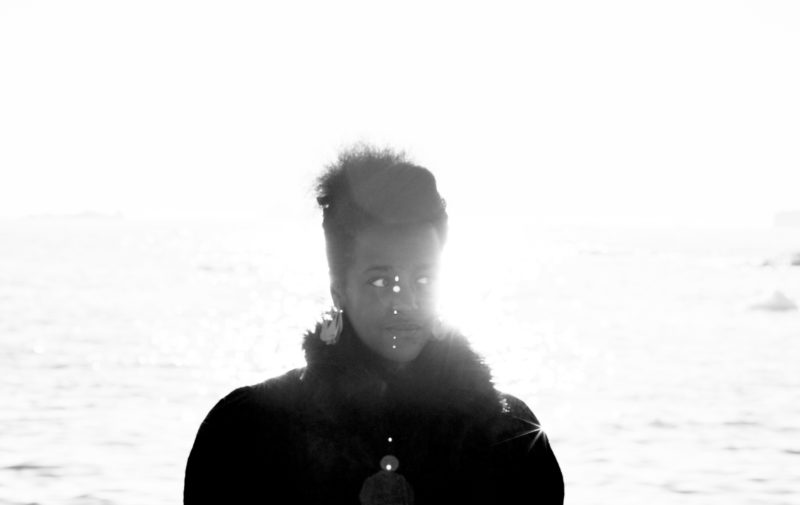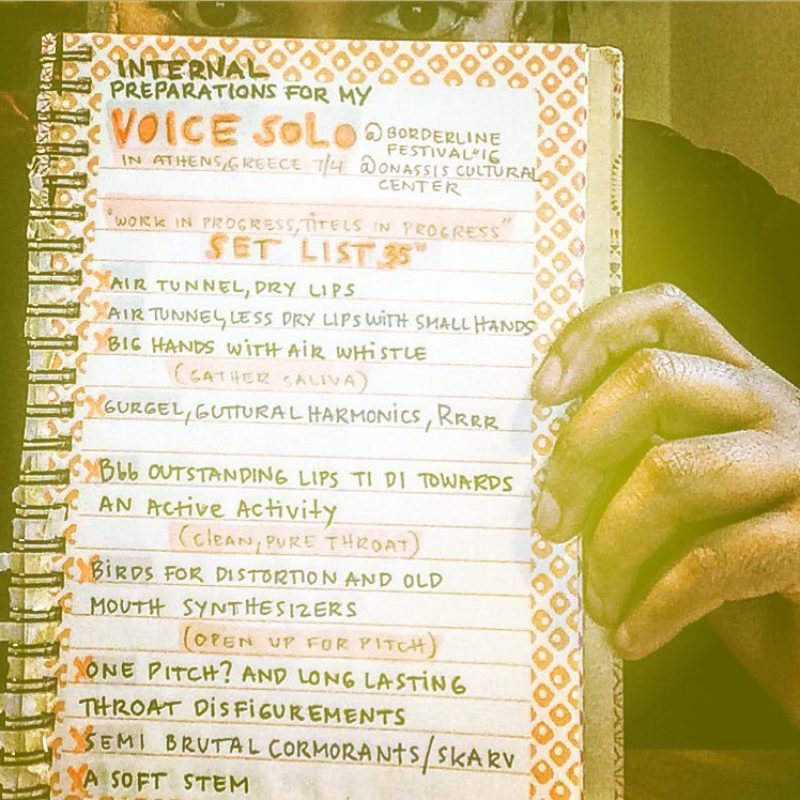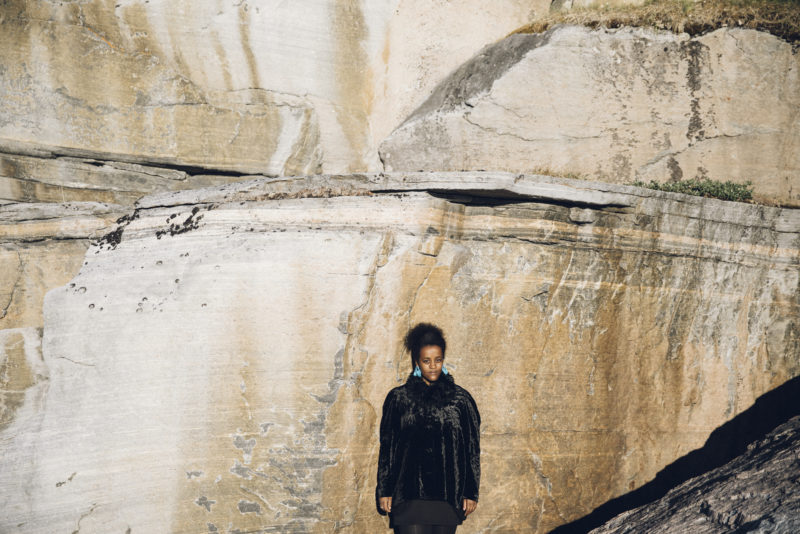Sofia Jernberg

Niels Latomme
Hey Sofia, hope you are well?
Sofia Jernberg
All good, sorry for the delay. Hope you are well too!
NL
I’m fine, trying to avoid the winter. But let’s talk about your music. You have an extensive career of collaborations in a very broad array of fields: from jazz, experimental overtone music to opera, performance and a lot of collaborations in visual arts, but you never released a solo album. How come?
SJ
I will, I’m not done yet! Ha, ha. I’ve been working on a solo vocal record for a very long time, around 5-7 years or so. When it comes to my own work I guess I like long processes… But I’ve started to notice an urge to release this material soon. I’ve been doing a lot of solo vocal performances the past years and have worked with the material long and hard enough now. Planning on recording this spring. But also, to be completely honest, I’m very hard on myself. Who isn’t? That is also an explanation. And I don’t push for my own work to happen if you get what I mean? In some ways I’m a very direct and brave person and can be very supportive towards others work. But I’m my own worst enemy. I hope I will be able to finish this record in 2019. Also I really like collaborative projects, that’s why I tend to prioritize them. I suspect I’m not so fond of being in the spotlight all the time. I also love to push myself to the limit for others. This gives me a lot of meaning in my life with music. Help realize others peoples dreams and artistic visions. This is a passion for me. And also I never stop learning.
NL
Your bio says singer, composer, other bios describe you as improviser; you do both improvised pieces as you perform written pieces by other composers. How does singing, composing, improvising and performing other people’s music relate to each other?
SJ
They relate to each other in a good way. The different roles I have in music are not in conflict but rather in a healthy symbiosis and this gives me a deeper understanding and strengthens my knowledge and craft. All experiences I have from the different things I’ve done help me handle every new complex contexts I end up in. It also widens my perspective, and that is a very important thing for me. It goes deep on many levels.
NL
You deconstructed the song Gigi’s Lament, by Ethiopian singer Ejigayehu Shibabaw. Why?
SJ
A while back Christoph Linder from Planet Rock put me and the legendary Hailu Mergia together. We did some shows. Before our first rehearsal Hailu asked me to bring Ethiopian songs I like. Even though I’m adopted I haven’t been completely disconnected from Ethiopia. We lived in Addis when I was a kid, my adoptive mother speaks Amharic, we have Ethiopian friends and I’ve listened to Ethiopian music all my life. When I was back in Addis in 2000 the movie Endurance was the talk of the town. I never saw the movie but I bought the record, a pirate copy, at Merkato. And on that record I heard this song for the first time. With Hailu Mergia, I wanted to do something different with this music that could resonate a little bit with my background and myself. I didn’t want to attempt to sing Ethiopian music the traditional Ethiopian way, since I can’t – I’ve got to much respect for that music to just try to copy or whatever. Hailu also liked my strange sounds a lot. But I did sing some of the songs, maybe also this one, in a straightforward way too but always maintaining my basic vocal timbre or klang that some people describe as reminiscent of a “pure nordic voice ideal”. Trying to understand what they mean I’ve come to think that ideal maybe actually comes from Great Britain, a lot of female folk singers from there sound a little like that. Who knows? Anyway, it was with him I sung this song the first time. Since the concerts with Hailu I’ve kept this song with me. Sometimes opening my solo vocal set with that song. Not always, though.
NL
Are there plans to release a collaborative record of Hailu and you?
SJ
A recording is not likely to happen at the moment as Hailu mainly focuses on his trio for now. But who knows, one day it might happen…
NL
The live recording raises the question: how much do you see yourself as a part of a tradition?
SJ
That is a complicated question to answer. I’ve listened to a lot of music. When I was young I was kind of a record maniac nerd. But I broke with that obsession a long time ago. Still, I do listen to many different kinds of music and am always interested to learn more. When I was young I did sing in a traditional way in the Western classical music genre. I sung loads of classical Western music and was very focused on doing the right thing or in a traditionally correct way. But the whole concept started to bore me a lot and also I couldn’t really identify with what I was doing. So in my mid-teenage years I changed direction. I assume you could say that direction is part of a tradition. Looking back in history you would call it part of the avant-garde tradition. But you can’t compare what I do with what they did since it doesn’t only relate to that. In order to explain that properly I would need several hours.

NL
I like this score (see picture) a lot. Do you always compose pieces in such a prosaic and direct way?
SJ
Oh! I was not prepared to see that again. How surprising. No, not at all. That is a set of words that remind me of what to do. The words have a very clear sonorous link. Someone else could use it as a score but then it would be up to him or her to define the music. In my case, I know exactly what sounds those words relate to. Although I haven’t defined every single little thing I do in my solo, it is partly composed with a very defined material. When I write for other people I do define stuff using Western musical notation.
NL
Do you have an idea of what we can expect at the KRAAK festival in March?
SJ
Be prepared for some extended vocals. No effects. That kind of thing à la Jernberg. You’ll hear it when you’re there.
N
Which artists do you feel related to?
SJ
Oh, so many, but also no one, I never had an idol. But I must give you something I guess. Great singers: Maria Callas, Diamanda Galas, Nina Stemme, Sainkho Namtchylack, Sidsel Endresen, Lena Willemark, Aster Aweke, Ella Fitzgerald, Janis Joplin, Yma Sumac, Alice Babs.
N
I recently re-read an old interview with Futurist Poet Valeri Scherstjanoi, who draws a distinction between the laut poets of the early 30s and their 50s heirs, the so-called Poésie sonore of Henri Chopin and alikes. What do you think of this line? Are laut poetry and Poésie sonore influences?
SJ
Well not really. Although, I listened to all the heroes. I wouldn’t want to be without it, including the people continuing this tradition. I’m very proud that we have some Swedish people who made some great stuff, for example Åke Hodell, Sten Hansson and Bengt Emil Jonsson. All of them are unfortunately dead. But we have a unique piano player/composer that I’ve had the privilege to work with, Sten Sandell. His PhD project was called Music Inside the Language, a kind of song cycle for three voices, piano and double bass. I was one of the voices in that piece of work. It’s truly beautiful musical material to work with. Personally my focus is on the sound, the extension, elasticity, layers, details and textures in sound rather than in words or lyrics. Sometimes I do like words in music as well but honestly my heart is in the sound with no words. That’s also why I don’t use any quasi-language or syllables that can be understood as some kind of language imitation in my vocal solo.
NL
Would you mind to send a hi-res, preferably unpublished photo we can use for the article?
S
Yes, unpublished photo is attached. Credit: Saga Sigurðardóttir
